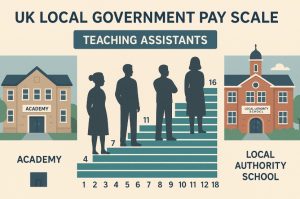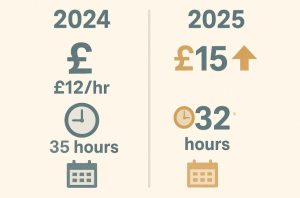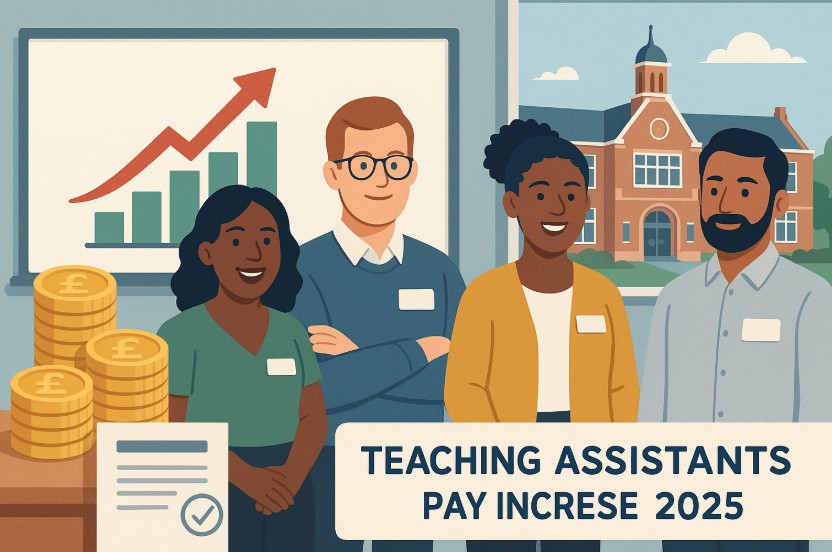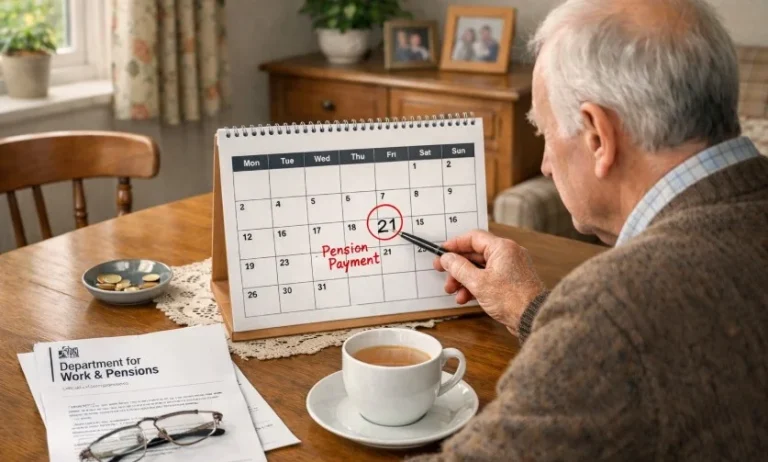Teaching assistant pay in the UK continues to be a significant topic of discussion, especially as staff wages struggle to keep pace with inflation and rising living costs.
The 2025 proposals aim to address long-standing issues with fairer pay, improved conditions, and clear progression.
Understanding how pay is structured, what changes are proposed, and how they may impact different school settings is crucial for support staff, school leaders, and policy influencers across the education sector.
What Is The Current Structure Of Teaching Assistant Pay In The UK?

The pay structure for teaching assistants across the United Kingdom is largely governed by the National Joint Council (NJC) for Local Government Services. Most local authority-maintained schools follow this pay scale to set salary levels for their support staff.
These arrangements are outlined in a document known as the Green Book, which defines terms and conditions, pay increments, and allowances.
Although the NJC provides a widely used framework, variations can occur due to the autonomy granted to different educational institutions.
Local authorities may implement local agreements, resulting in slight differences in pay scales across regions.
Furthermore, each employee’s contract should include specific details about their spinal column point (SCP), which determines their position within the pay scale and how they will progress incrementally.
Academies and Multi-Academy Trusts (MATs), while independent, often continue to follow NJC pay structures to maintain consistency and fairness across their staffing models. Free schools, by contrast, have full discretion over their pay policies and may choose not to align with the NJC at all.
What Was Agreed In The 2024/25 Support Staff Pay Deal?
The pay agreement for the 2024/25 financial year was reached between the recognised local government unions (Unison, GMB, and Unite) and the Local Government Association (LGA).
Despite opposition from many NEU members, who were not part of the formal negotiations but voiced concerns, the final agreement was implemented across local government employers.
Here is a breakdown of the agreed pay increase:
| Element | Detail |
| Base Pay Increase | £1,290 (pro rata for part-time employees) |
| NJC Pay Points Affected | Points 2 to 43 |
| Percentage Equivalent | 5.7% at bottom of the scale, 2.5% at top |
| Allowances | Increased by 2.5% |
Although the NEU members voted overwhelmingly to reject the offer (92% in England and 96% in Wales), the three recognised unions proceeded with accepting it.
As part of wider education funding discussions, the NEU successfully negotiated with the government to secure an additional £1.2 billion for schools. This ensured both the teachers’ and support staff pay deals could be met without forcing schools to make cuts in other areas.
What Is The Proposed Pay Rise For Teaching Assistants In 2025/26?

The proposed pay rise for teaching assistants in the 2025/26 period reflects growing concern over inflation, job retention, and the value of support staff within the education sector. The National Joint Council (NJC) unions have submitted a collective pay claim to address these issues more assertively than in previous years.
Overview Of The 2025/26 NJC Pay Claim
The NJC unions are demanding a flat-rate increase of £3,000 for all support staff across spinal column points. This move represents a shift from percentage-based increases to a universal flat rate, ensuring more equitable pay boosts across lower and higher pay bands.
The claim also includes:
- A plan to raise the minimum hourly rate to £15
- One extra day of annual leave for all school support staff
- A two-hour reduction in the standard working week without any pay loss
- The option for support staff to take one day of annual leave during term time
This ambitious claim is not just about financial recognition. It is about improving working conditions and ensuring the roles of support staff are both financially and professionally sustainable.
Rationale Behind The Proposed Increase
Several factors have led to this assertive pay submission:
- Cost of living crisis: Inflationary pressures continue to outpace wage growth, especially in lower-paid roles such as teaching assistants.
- Recruitment and retention: A growing number of schools report challenges in hiring and keeping experienced support staff.
- Professional recognition: The demand for a £15 minimum hourly wage is part of a broader campaign to establish support staff roles as skilled and vital components of school operations.
NEU’s Involvement In Shaping The Claim
Though the NEU is not one of the recognised NJC unions, it has played a pivotal role in shaping the conversation. Through collaboration under a Trades Union Congress (TUC) agreement with Unison and Unite, the NEU contributed to early-stage discussions, strengthening the case for a fair and impactful pay rise.
Their participation also reinforces cross-union support, creating a more unified front in negotiations with employers and the government.
How Are Teaching Assistant Pay Changes Decided And Negotiated?
The process of determining teaching assistant pay changes involves a series of structured steps involving trade unions, employer representatives, and, at times, government intervention. The system is formalised yet flexible enough to accommodate input from various education stakeholders.
Role Of The NJC And Recognised Unions
The National Joint Council (NJC) is the formal body through which local government pay is negotiated. The recognised unions in these negotiations include Unison, GMB, and Unite. These organisations collect feedback from members and use it to formulate annual pay claims.
Once the pay claim is submitted, negotiations begin with the Local Government Association (LGA), which represents the employers. These discussions are aimed at agreeing on an offer that balances fair pay with local authority budgets.
Stages Of The Negotiation Process
The negotiation process generally follows these stages:
- Union Consultations and Snap Polls: Unions survey members to determine support for specific demands. For example, in 2024, a NEU snap poll had 99.5% of respondents vote in favour of submitting a new pay claim.
- Pay Claim Submission: A formal claim is submitted to the LGA, outlining salary increases, additional leave, reduced hours, and other employment benefits.
- Employer Response and Counteroffers: The LGA reviews the claim and issues a counteroffer based on affordability and government funding forecasts.
- Member Ballots on Offers: Once a final offer is made, unions consult members through votes or ballots to determine acceptance or rejection.
- Acceptance or Industrial Action Planning: If members accept the offer, it becomes binding. If rejected, unions may begin preparations for industrial action.
NEU’s Contribution And Influence
While the NEU is not formally part of the NJC bargaining group, it increasingly contributes through:
- Advisory input: Offering member feedback and recommendations during early stages
- Strategic collaboration: Working with recognised unions to create unified bargaining strategies
- Funding negotiations: Lobbying government for additional education funding to meet pay agreement obligations
This influence was evident in 2024, when NEU pressure secured £1.2 billion in extra funding to help schools afford the accepted pay increases.
Importance Of Multi-Union Solidarity
Multi-union collaboration plays a vital role in strengthening the negotiating position. When unions present a united front, their collective voice carries more weight with employers and government departments. This solidarity is especially critical in ensuring teaching assistants, who are often overlooked in favour of teaching staff, receive adequate recognition and fair compensation.
Why Is An Inflation-Beating Pay Rise Vital For Teaching Assistants?

Support staff in schools have experienced a prolonged period of stagnant wages. According to union data, teaching assistants have lost nearly 20 percent of their real-term earning power over the past 15 years due to inflation outpacing annual wage increases.
This erosion has led to a recruitment and retention crisis, as many experienced support staff leave the profession in search of better-paid roles elsewhere.
The impact of low wages extends beyond individual financial hardship. Schools face greater difficulty in maintaining stable and experienced support teams, which in turn affects the quality of pupil support, classroom management, and the overall learning environment.
In recent years, the rise in living costs, including housing, energy, and transport, has further exacerbated these issues. Unions argue that only a meaningful, inflation-beating pay rise will reverse this trend and help re-establish support staff roles as sustainable and respected careers.
What Is The NEU’s Stance On The Teaching Assistant Pay Offer?
The National Education Union has maintained a critical stance toward previous pay offers made to support staff. Following the 2024/25 deal, the NEU expressed its readiness to engage in industrial action had the recognised unions not accepted the offer. Their membership’s rejection rates highlight the dissatisfaction among TAs and other support roles.
Despite this, the NEU successfully lobbied for additional school funding to ensure pay awards could be met. Their efforts resulted in a £1.2 billion government grant, intended to support both teacher and support staff salaries.
Looking ahead, the NEU is focused on strengthening collective bargaining for support staff and is calling for a joint union organising campaign. Such a campaign would aim to improve representation and amplify the voice of TAs in both pay negotiations and workplace discussions.
How Does Backdated Pay Affect Universal Credit Payments?
The financial implications of backdated pay are an important consideration for many support staff, particularly those who receive Universal Credit. A single lump sum payment, even if deserved, may result in a temporary reduction of benefits during the assessment period in which it is received.
To manage this issue, the NEU has advised members to request staggered payment of any backdated wages. This strategy spreads the additional income over several months, which can help reduce the risk of benefit deductions.
Employers are not obligated to offer staggered payments unless specifically requested by the employee. The NEU has created template letters that support staff can use to formally make such requests. While no standard time frame is required, a three-month staggered schedule is commonly seen as practical.
This issue is especially critical as it could discourage some from accepting their full back pay if they fear losing access to essential benefits. Unions are calling for improved coordination between government welfare systems and payroll practices to prevent such conflicts.
How Do Different School Types Impact Teaching Assistant Pay Scales?
While the NJC pay scale is the default for most local authority schools, the structure can vary significantly depending on the school’s governance model. Understanding these differences is key to appreciating how pay policies are implemented.
| School Type | Pay Structure | Notes |
| Local Authority | Follows NJC pay scale | Incremental SCP increases, aligned with Green Book |
| Multi-Academy Trusts | Mostly NJC-aligned | Policies vary slightly across trusts |
| Free Schools | Independent pay policies | Not required to follow NJC or Green Book agreements |
While most MATs and academies adopt NJC conditions for fairness and consistency, free schools may establish their own frameworks. Employees in these settings should check contracts carefully to determine their entitlements.
What Are The Key Differences In Teaching Assistant Pay Bands In 2024 Vs 2025?

The 2024/25 pay agreement and the 2025/26 pay proposal differ in both value and scope. The 2024/25 settlement offered a flat-rate increase of £1,290, whereas the 2025/26 union claim aims to push this figure significantly higher.
| Year | Pay Increase | Hourly Rate Goal | Additional Conditions |
| 2024/25 | £1,290 (flat rate) | Approx. £11.60 | +1 day annual leave, 2.5% on allowances |
| 2025/26 | £3,000 (proposed) | £15 (target minimum) | Term-time leave flexibility, reduced hours |
The 2025 claim goes beyond just financial improvement. It includes proposals designed to support staff wellbeing and encourage retention through improved work-life balance.
What Funding Is Available To Support The 2025 Pay Rise For Teaching Assistants?
One of the major challenges surrounding any proposed pay increase is whether schools will receive adequate government funding to implement it. The 2024 deal was only made feasible due to the additional £1.2 billion secured by unions through intense lobbying.
For 2025, funding availability will depend on:
- National budget allocations for education
- Local authority funding formulas
- MAT and academy financial reserves
- Continued pressure from trade unions and stakeholders
Without dedicated financial support, schools may struggle to implement the proposed rises without negatively affecting staffing levels or resources. Unions stress that fair pay must come with fair funding, and campaign efforts will likely intensify ahead of the 2025/26 academic year.
Conclusion
The 2025 teaching assistant pay proposals highlight the urgent need for meaningful wage reform within the UK’s education system.
With calls for a substantial uplift, improved working conditions, and coordinated union efforts, there’s growing momentum for change.
As schools await funding decisions and formal negotiations, the hope remains that support staff will receive the recognition and remuneration they deserve.
Ensuring fair pay is not only a matter of equity but essential for retaining skilled professionals in schools nationwide.
Frequently Asked Questions
How is the teaching assistant pay scale determined in local authority schools?
It’s based on the NJC pay spine, with each employee assigned a spinal column point. Pay increases incrementally over time unless negotiated otherwise.
Will all teaching assistants receive the same pay increase in 2025?
Not necessarily. While the union claim suggests a £3,000 increase for all, the final agreement may vary and depend on job role, school type, and local authority policy.
Are academies legally required to follow NJC pay agreements?
No. However, most academies still align their policies with NJC standards to remain competitive and fair.
How do I find out which spinal point I am on as a teaching assistant?
You should check your employment contract or contact your school’s HR department. It will specify your spinal point and progression rules.
Can I request staggered back pay to avoid Universal Credit disruption?
Yes, you can. The NEU provides template letters for such requests. Staggered payment helps spread the additional income over months.
What happens if my school doesn’t implement the pay agreement?
You should contact your union representative immediately. They can help raise the issue with the local authority or employer body.
What does the “Green Book” mean for support staff pay and conditions?
It’s the National Agreement on Pay and Conditions of Service, used by most local government employers. It outlines the terms applied to support staff in schools.








